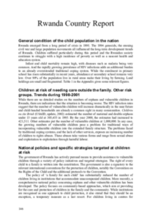Rwanda emerged from a long period of crisis in 1998. The 1994 genocide, the ensuing civil war, and large-scale population movements all influenced national long-term development trends. Children suffered particularly during this period and the Rwandan society continues to struggle with a high incidence of poverty as well as a nascent health and education system.
Infant and child mortality remain high, with diseases such as malaria being very common. And the rapidly growing prevalence of HIV infections adds an additional burden to an already overextended traditional coping system. While the enrolment in primary school has risen substantially in recent years, attendance at secondary school remains very low. Over 90% of the population live in rural areas make their living by farming. Land holdings are small and fragmented.

